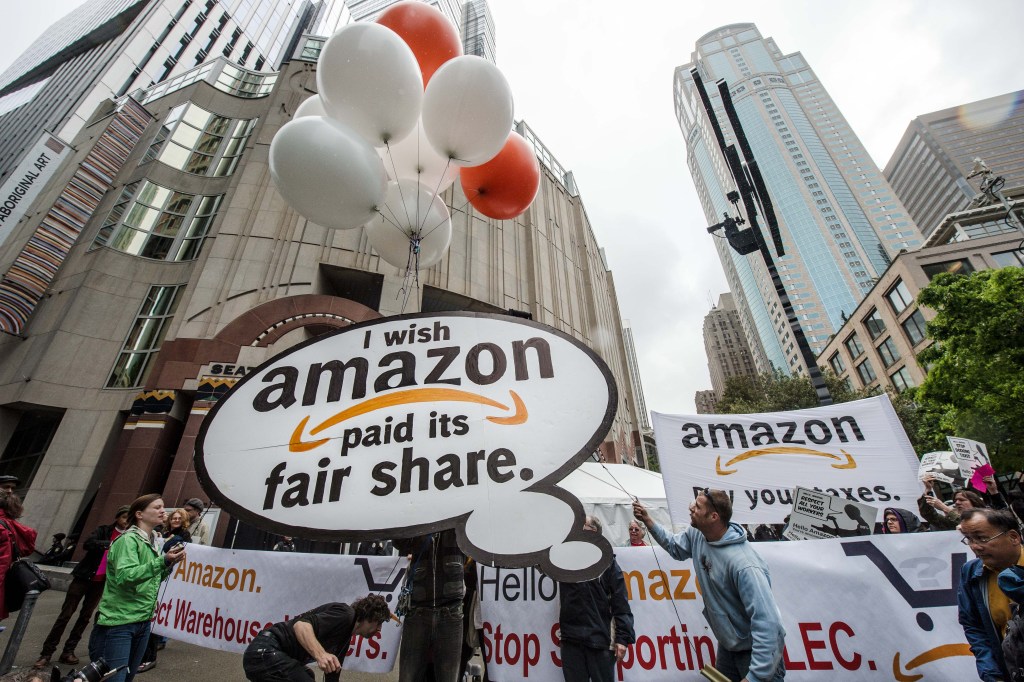Funders have an opportunity to promote a new model of economic development where communities benefit as much as corporations like Amazon.
There’s nothing like an outrageous corporate tax-break money grab to bring people together.
That’s our takeaway from the year-long auction Amazon.com Inc. staged for its second headquarters or “HQ2.”
Amazon’s transparently ham-handed quest to secure a multibillion-dollar tax-break package attracted 238 bids and led the company to choose 2 new locations: the Virginia suburbs of Washington, D.C., and Queens, New York.
Community leaders in both cities have been quick to question the wisdom of spending billions in public money to attract the company most responsible for Seattle’s ongoing affordable housing crisis to places already burdened with their own housing challenges.
The Amazon HQ2 circus has brought intense scrutiny to a corporate-dominated site-selection process, where local governments passively grant huge incentive giveaways while demanding too little in return.
Communities are organizing to ensure that HQ2 benefits the 99% as much as it benefits Jeff Bezos, Amazon’s CEO and the world’s richest person.
It’s time that foundations and donors who care about fair housing, homelessness, local businesses and good jobs join them to change what economic development could look like.
Does anyone benefit from Amazon besides Amazon?
People coast to coast questioned the cost-benefit analysis of HQ2 coming to their town. Amazon’s voracious growth – arguably the key factor that drove cities and states to fall over themselves to court HQ2 – is undeniable.

A protest against Amazon business practices at the Seattle Art Museum on May 24, 2012. Photo from www.flickr.com/photos/Backbone_Campaign, used under Creative Commons license.
In 2017, the company hired more new employees every quarter than Facebook employs altogether.
Yet, the potential benefits of job growth don’t accrue to every community. The Economic Policy Institute found that the arrival of an Amazon warehouse doesn’t grow overall local employment.
This indicates that the $1.6 billion in state and local subsidies used to attract Amazon since 2000 (as Good Jobs First has documented) was wasted and could have been better spent on public services.
Amazon’s complicated impacts on local and regional economies are well-documented, including the company’s role in gentrification and homelessness in Seattle, the poverty wages that force its warehouse workers to depend on social safety net programs and a predatory, monopolistic business model that trampled local booksellers.
According to a report from the Institute for Local Self Reliance, Amazon undercuts even its own third-party sellers.
Its values are suspect: Action on Race and the Economy and the Partnership for Working Families (PWF) revealed that Amazon continues to profit from selling white supremacist and Islamophobic merchandise. And Mijente and others have shown that Amazon provides crucial support to ICE’s efforts to track, detain and deport immigrants.
Communities in the front lines of equitable economic development
A surge of local organizing from the left and right (such as the Koch brothers-backed Generation Opportunity’s social media campaign) is demanding that Amazon must agree to come to the table to negotiate a Community Benefits Agreement (CBA) to ensure that incumbent residents in Queens and suburban Virginia will benefit from HQ2 rather than be its collateral damage.
CBAs are contracts between corporations and community coalitions that can cover a wide range of safeguards such as local hiring and procurement, affordable housing, public transit, small business development and environmental improvements.
Since the announcement of HQ2, numerous coalitions of community groups have popped up across the country to advocate for the well-being of our communities in negotiations and final selection of the new headquarters.
For example, PWF, Jobs with Justice and 130 other groups issued an open letter to Amazon CEO Jeff Bezos at ourHQ2wishlist.org enumerating key community demands, including no tax dodging and a robust public engagement process.
4 Ways funders can support HQ2 communities
These efforts to put local voices at the center of the conversation and keep community demands front and center in the debate require philanthropic resources to counter the avalanche of expensive corporate PR campaigns that will surely come now that Amazon has selected suburban Virginia and Queens as its HQ2 locations.
The locations (where the company’s growth will play out for a decade or more) will also need ongoing support for work on Amazon’s wide-ranging effects in many sectors of the economy.
How can funders make a difference?
Here are 4 ways philanthropy can step up to support local organizing to combat Amazon’s dominance in the economic development conversation:
1. Look beyond issue silos.
“Funders can have the most impact by funding multifaceted coalitions that represent communities and workers as a whole,” Partnership for Working Families Executive Director Lauren Jacobs explains. “The fight over Amazon’s new campuses is not just about jobs – it’s about empowering communities to shape their own futures and preserve the rich cultures and histories that make these cities attractive to tech corporations and gentrifiers.”
2. Move money to organizations in communities that are directly affected by HQ2.
It’s especially important for funders to support efforts that build the power and amplify the voices of low-income people and especially Black, Latinx, Asian-American and other communities of color.
3. Identify ways your current grantmaking priorities will be impacted by Amazon’s outsized influence in impacted communities.
Examples of relevant issue areas include housing affordability, food access, green development and more.
4. Wield your own power beyond grantmaking dollars as community, business and political leaders to benefit low-income people.
Use your voice to advocate polices that ensure shared prosperity and question corporate dominance of state and local policymaking.
Amazon’s 2 new headquarters could become monuments to high-tech arrogance that deepen economic and racial inequality in our cities. Or, they could become economic development game-changers: a new model of corporate accountability and community power generating broadly shared benefits. The moment is ours to seize!
Greg LeRoy (@GregLeRoy4) is executive director of Good Jobs First (@goodjobsfirst). Ryan Schlegel (@r_j_schlegel) is the research director of NCRP (@NCRP).